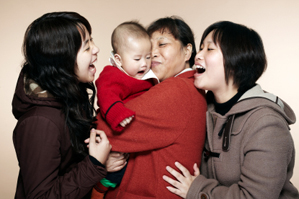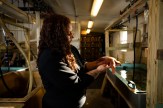We love babies!

 Last week we had a couple of visitors to the communications office — a colleague out on maternity leave and her beautiful new baby girl.
Last week we had a couple of visitors to the communications office — a colleague out on maternity leave and her beautiful new baby girl.
When they arrived sounds of “ooohs” and “ahhs” started echoing through the halls and one by one we filtered out of our offices to see the youngest species-member on the floor. After a bit we moved into the boss’s office so those wanting to do “work” didn’t have to listen to our high pitched hallway chatter.
We all stood around in a circle, awkwardly staring at the baby with big goofy grins on our face. There were probably about twenty or so people — men and women alike. We took turns passing the tiny bundle between us, ogling over her adorably small finger nails. Eventually I looked up and noticed that the men had somehow disappeared and all that was left were us females, still grinning wildly, biological clocks pounding in unison.
The next day a male colleague stepped into my office to comment on the fascinating anthropological phenomenon that had transpired the day before. He said we could have been speaking Bengali in the 1300s but it would have otherwise been exactly the same scene: “People have been doing that same thing for thousands of years,” he said.
His comment got me thinking — there must be something physiological going on there, right? There must be something in our genes that urges us to congregate around babies and their mothers. So I reached out to our affective science team in the psychology department to find out. As it happens, we have a post-doctoral scholar, Dr. Shir Atzil, focusing on this exact question! Specifically, she is looking at how we recognize infants and maternal behavior.
“Infants stimulate a certain reaction that has to do with maternal behavior,” she said. “It’s a stereotypic set of behaviors unique for each species.” The response is more robust when it’s our own infant, having actually entered a unique biological state after giving birth (true for both mothers and fathers). Additionally, the interactions themselves impact the infant’s long-term psychological and biological processes.
But other members of the species can react similarly to the biological mother, as we clearly saw here on the 5th floor of Columbus Place last week. Alloparenting is something that mothers across mammalian species do: when they see a child, they start to take on the maternal role. Even a mama-sheep will treat an unrelated cub like her own if she’s already given birth in the past.
It makes sense of course, it’s evolutionarily adaptive. “Maternal behavior is a crucial component for survival,” said Atzil. Not just of the individual, but for the species as a whole. For women, the response is more intuitive, happening at “low brain regions,” whereas the paternal response is more cognitive, said Atzil.
So we were all standing around the office the other day with certain brain regions firing uncontrollably, our maternal behavior instincts were engaged and if anything happened to the real mamma, we were going to make sure that baby survived to have babies of her own one day. “Such stereotypic maternal behaviors are deeply rooted in mammalian biology, and in humans, also in cultural norms,” said Atzil.
I love it when I can blame my actions on evolution.





